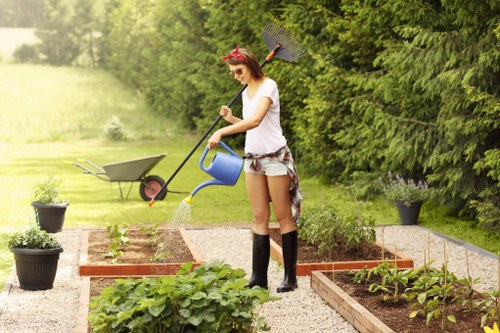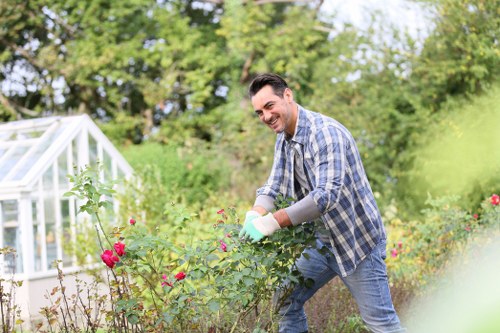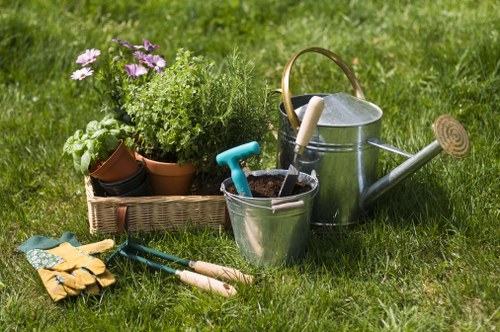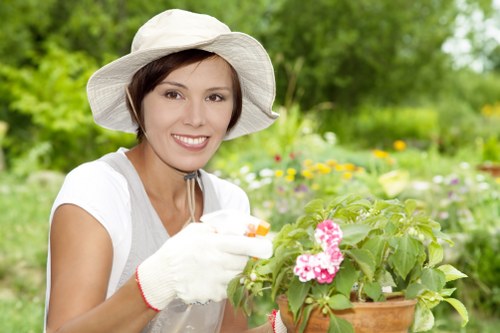Transform Your Outdoor Space: Landscape Gardening in West Ham
Introduction to Landscape Gardening in West Ham

Landscape gardening in West Ham offers residents a unique opportunity to create aesthetically pleasing and functional outdoor spaces. Whether you're looking to design a serene backyard retreat or a vibrant community garden, understanding the local climate, soil conditions, and plant varieties is essential.
West Ham's diverse environment provides a rich tapestry for gardeners to experiment with various styles, from traditional English gardens to modern minimalist designs. Embracing sustainable practices can also enhance the beauty and longevity of your garden.
In this comprehensive guide, we'll explore the key elements of landscape gardening in West Ham, offering tips and ideas to help you cultivate a stunning garden that complements your lifestyle and the local landscape.
The Importance of Planning Your Landscape Garden

Effective landscape gardening begins with meticulous planning. Assessing your outdoor space's size, shape, and existing features will help you determine the best layout and design elements. Consider factors such as sunlight exposure, drainage, and accessibility when mapping out your garden.
Establishing clear goals for your garden is crucial. Are you aiming to create a peaceful sanctuary, a space for entertaining, or a vibrant habitat for local wildlife? Defining your objectives will guide your choice of plants, materials, and garden structures.
Moreover, creating a budget and timeline will ensure your landscape project remains feasible and manageable. Prioritize essential elements and consider phased implementations to spread costs over time.
Choosing the Right Plants for West Ham Gardens

Selecting appropriate plant species is vital for the success of your landscape garden in West Ham. Opt for native plants that thrive in the local climate and soil conditions, as they typically require less maintenance and are more resistant to pests and diseases.
- Perennials: These plants return year after year, providing consistent color and structure to your garden.
- Shrubs: Ideal for creating privacy screens or adding vertical interest.
- Trees: Offer shade, habitat for wildlife, and a sense of permanence.
- Annuals: Add seasonal bursts of color and can be changed regularly to keep your garden dynamic.
Incorporating a mix of evergreen and deciduous plants ensures your garden maintains visual interest throughout the year. Additionally, consider the height, spread, and growth rate of each plant to avoid overcrowding and ensure harmonious arrangements.
Designing Functional Outdoor Spaces

A well-designed landscape garden seamlessly integrates beauty and functionality. Creating distinct zones for different activities enhances the usability of your outdoor space.
- Seating Areas: Designate spots for relaxation and socializing, such as patios, benches, or gazebos.
- Dining Areas: Incorporate outdoor dining sets for al fresco meals and gatherings.
- Play Areas: Allocate safe and engaging spaces for children to play.
- Pathways: Use pathways to guide visitors through the garden, adding both practicality and charm.
Incorporating elements like water features, fire pits, and lighting can further enhance the ambiance and functionality of your garden.
Embracing Sustainable Gardening Practices

Sustainability is a key aspect of modern landscape gardening. Implementing eco-friendly practices not only benefits the environment but also contributes to the long-term health of your garden.
- Rainwater Harvesting: Collecting and utilizing rainwater reduces dependence on municipal water sources.
- Composting: Recycling organic waste enriches the soil and reduces landfill burden.
- Native Plant Selection: Native species require less water and are better adapted to local pests and diseases.
- Organic Mulching: Helps retain soil moisture, suppress weeds, and improve soil structure.
- Integrated Pest Management: Combines biological, cultural, and mechanical methods to control pests with minimal chemical use.
By adopting these sustainable practices, you can create a resilient and thriving landscape garden that aligns with environmental stewardship.
Maintenance Tips for a Thriving Garden

Regular maintenance is essential to preserve the beauty and health of your landscape garden. Establishing a maintenance routine helps prevent issues and ensures your garden remains vibrant throughout the seasons.
- Pruning: Regularly trimming plants promotes healthy growth and maintains desired shapes.
- Weeding: Timely removal of weeds prevents competition for nutrients and reduces pest habitats.
- Irrigation: Ensure plants receive adequate water through efficient irrigation systems or manual watering practices.
- Fertilizing: Provide necessary nutrients to support plant growth and development.
- Pest Control: Monitor for signs of pests and diseases, addressing them promptly with appropriate measures.
Investing time and effort into garden maintenance will reward you with a lush and inviting outdoor space that enhances your property's value and enjoyment.
Enhancing Your Garden with Hardscaping Elements

Hardscaping features complement the natural elements of your garden, adding structure and visual interest. Incorporating elements like pathways, patios, walls, and garden art can elevate the overall design of your landscape.
- Patios: Create comfortable outdoor living areas for dining and relaxation.
- Pathways: Guide visitors through your garden while adding architectural detail.
- Walls and Fences: Provide privacy, define boundaries, and support climbing plants.
- Water Features: Install fountains, ponds, or waterfalls to introduce soothing sounds and enhance ambiance.
- Garden Art: Add sculptures, ornaments, or decorative stones to personalize your garden space.
Integrating hardscaping elements thoughtfully ensures a cohesive and harmonious garden design that balances natural beauty with functional structures.
Seasonal Considerations for West Ham Gardens

Understanding the seasonal changes in West Ham is crucial for maintaining a vibrant landscape garden. Each season presents unique opportunities and challenges for gardeners.
- Spring: Focus on planting new growth, pruning, and preparing the garden for the warmer months.
- Summer: Maintain adequate watering, control pests, and enjoy the full bloom of your plants.
- Autumn: Prepare for cooler weather by harvesting, mulching, and planting winter-friendly species.
- Winter: Protect sensitive plants, manage snow and ice, and plan for the upcoming gardening season.
Adapting your gardening practices to the seasonal rhythms ensures your landscape remains healthy and beautiful all year round.
Hiring a Professional Landscape Gardener in West Ham

While DIY gardening can be rewarding, hiring a professional landscape gardener in West Ham can provide expertise and efficiency for more complex projects. Professionals offer valuable insights into design, plant selection, and sustainable practices tailored to your specific needs.
When selecting a landscape gardener, consider their experience, portfolio, and client reviews. A skilled gardener will collaborate with you to bring your vision to life while ensuring the practicality and longevity of the design.
Investing in professional services can save time, reduce stress, and result in a beautifully crafted garden that enhances your property's appeal.
Conclusion: Create Your Dream Garden in West Ham

Landscape gardening in West Ham is an enriching endeavor that combines creativity, sustainability, and practicality. By carefully planning your garden, selecting the right plants, incorporating functional and aesthetic elements, and maintaining your outdoor space diligently, you can create a stunning and harmonious landscape.
Whether you embark on this journey alone or seek the expertise of a professional, the rewards of a well-designed garden are manifold. From providing a serene retreat to enhancing property value, your landscape garden will be a source of pride and enjoyment for years to come.
Ready to transform your outdoor space? Contact us today to start your landscape gardening journey in West Ham and cultivate the garden of your dreams.

